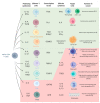Impact of Immunotherapy on CD4 T Cell Phenotypes and Function in Cancer
- PMID: 34064410
- PMCID: PMC8147771
- DOI: 10.3390/vaccines9050454
Impact of Immunotherapy on CD4 T Cell Phenotypes and Function in Cancer
Abstract
Immunotherapy has become a standard treatment in many cancers and it is based on three main therapeutic axes: immune checkpoint blockade (ICB), vaccination and adoptive cell transfer (ACT). If originally these therapies mainly focused on exploiting CD8 T cells given their role in the direct elimination of tumor cells, increasing evidence highlights the crucial role CD4 T cells play in the antitumor immune response. Indeed, these cells can profoundly modulate the tumor microenvironment (TME) by secreting different types of cytokine or by directly eliminating cancer cells. In this review, we describe how different CD4 T cell subsets can contribute to tumor immune responses during immunotherapy and the novel high-throughput immune monitoring tools that are expected to facilitate the study of CD4 T cells, at antigen-specific and single cell level, thus accelerating bench-to-bed translational research in cancer.
Keywords: CD4 T cells; antigen-specific; cancer; immune monitoring; immunotherapy.
Conflict of interest statement
The authors declare no conflict of interest.
Figures




Similar articles
-
Prospects for personalized combination immunotherapy for solid tumors based on adoptive cell therapies and immune checkpoint blockade therapies.Nihon Rinsho Meneki Gakkai Kaishi. 2017;40(1):68-77. doi: 10.2177/jsci.40.68. Nihon Rinsho Meneki Gakkai Kaishi. 2017. PMID: 28539557 Review.
-
CD8+ cytotoxic T lymphocytes in cancer immunotherapy: A review.J Cell Physiol. 2019 Jun;234(6):8509-8521. doi: 10.1002/jcp.27782. Epub 2018 Nov 22. J Cell Physiol. 2019. PMID: 30520029 Review.
-
The Tumor Microenvironment in the Response to Immune Checkpoint Blockade Therapies.Front Immunol. 2020 May 7;11:784. doi: 10.3389/fimmu.2020.00784. eCollection 2020. Front Immunol. 2020. PMID: 32457745 Free PMC article. Review.
-
Innate Immune Cells and Their Contribution to T-Cell-Based Immunotherapy.Int J Mol Sci. 2020 Jun 22;21(12):4441. doi: 10.3390/ijms21124441. Int J Mol Sci. 2020. PMID: 32580431 Free PMC article. Review.
-
CD4+ T cell exhaustion leads to adoptive transfer therapy failure which can be prevented by immune checkpoint blockade.Am J Cancer Res. 2020 Dec 1;10(12):4234-4250. eCollection 2020. Am J Cancer Res. 2020. PMID: 33414997 Free PMC article.
Cited by
-
A decade of CD4+ chimeric antigen receptor T-cell evolution in two chronic lymphocytic leukemia patients: were chronic lymphocytic leukemia cells present?Explor Target Antitumor Ther. 2023;4(5):1128-1135. doi: 10.37349/etat.2023.00186. Epub 2023 Oct 31. Explor Target Antitumor Ther. 2023. PMID: 37970204 Free PMC article.
-
Mesenchymal Stem/Stromal Cells: Immunomodulatory and Bone Regeneration Potential after Tumor Excision in Osteosarcoma Patients.Bioengineering (Basel). 2023 Oct 13;10(10):1187. doi: 10.3390/bioengineering10101187. Bioengineering (Basel). 2023. PMID: 37892917 Free PMC article. Review.
-
The Era of Cytotoxic CD4 T Cells.Front Immunol. 2022 Apr 27;13:867189. doi: 10.3389/fimmu.2022.867189. eCollection 2022. Front Immunol. 2022. PMID: 35572552 Free PMC article. Review.
-
CD4+ T cells in cancer.Nat Cancer. 2023 Mar;4(3):317-329. doi: 10.1038/s43018-023-00521-2. Epub 2023 Mar 9. Nat Cancer. 2023. PMID: 36894637 Review.
-
Deciphering CD4+ T cell-mediated responses against cancer.Mol Carcinog. 2024 Jul;63(7):1209-1220. doi: 10.1002/mc.23730. Epub 2024 May 9. Mol Carcinog. 2024. PMID: 38725218 Free PMC article. Review.
References
-
- Laheurte C., Dosset M., Vernerey D., Boullerot L., Gaugler B., Gravelin E., Kaulek V., Jacquin M., Cuche L., Eberst G., et al. Distinct prognostic value of circulating anti-telomerase CD4(+) Th1 immunity and exhausted PD-1(+)/TIM-3(+) T cells in lung cancer. Br. J. Cancer. 2019;121:405–416. doi: 10.1038/s41416-019-0531-5. - DOI - PMC - PubMed
Publication types
LinkOut - more resources
Full Text Sources
Research Materials

